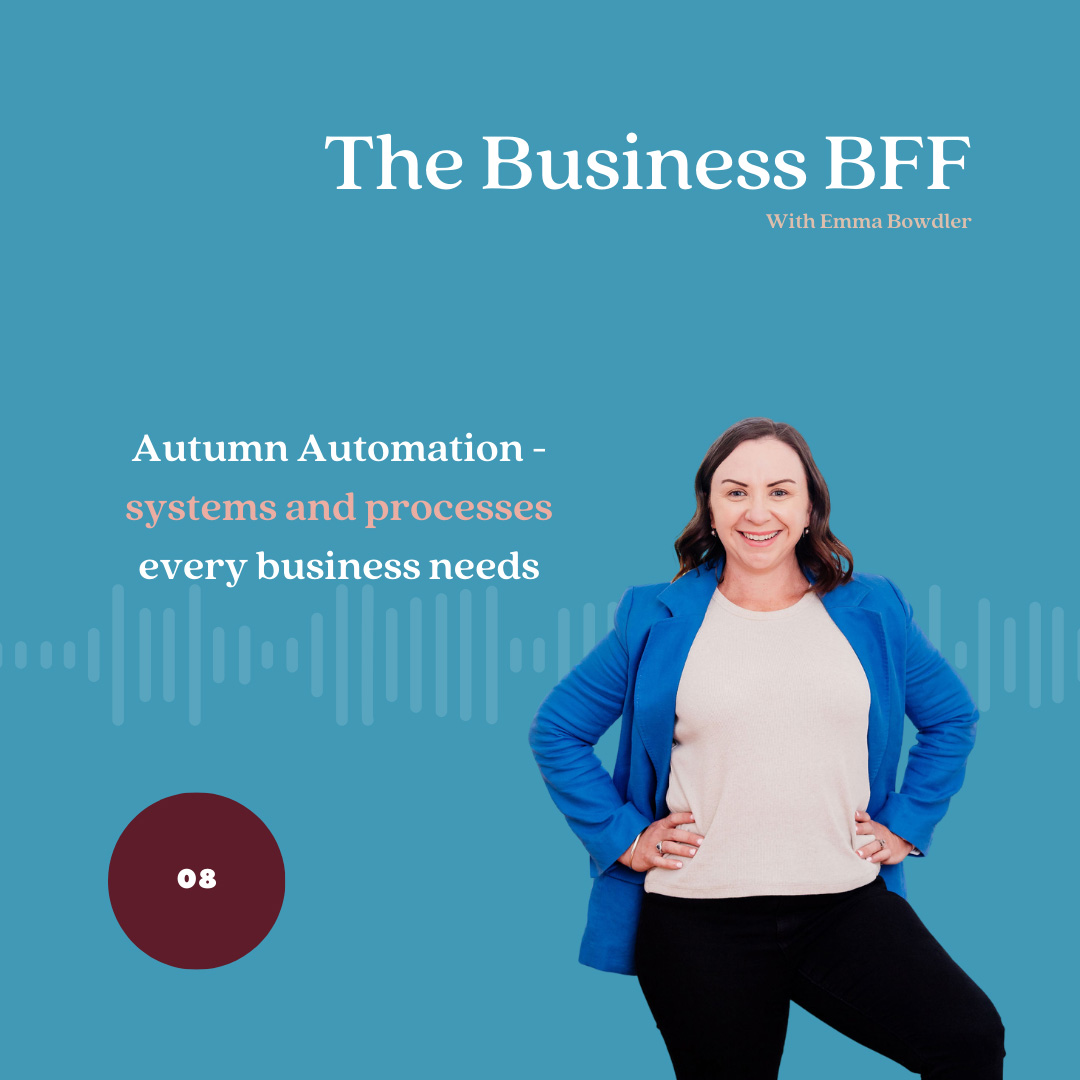The Business BFF Podcast – Episode 8:
Autumn Automation – Systems & Processes Every Business Needs
11 April 2025
If your business feels like organised chaos, it’s time to talk systems. In this episode, Emma breaks down the essential processes every business needs to save time, reduce stress, and create a business that runs smoothly—even when you’re not there.
From automating repetitive tasks to making your business more valuable (yes, systems can increase the value of your business), Emma shares the five key areas where solid systems make all the difference. Plus, she’ll walk you through the best tools to get started—without the overwhelm.



Episode 8: Autumn Automation – Systems & Processes Every Business Needs
temp
Episode Transcript:
[00:00:00] Emma: Today. We’re talking about something that can completely transform the way that you run your business and that systems and processes. Now, I know what you might be thinking, Em, I barely have time to breathe, let alone to think about systems. here’s the thing, the time that you spend building systems now could save you so much time and so many headaches in the future. this episode, we’re breaking down why systems matter now more than ever. how they can save you time, reduce your stress, and even make your business more valuable. Whether you’re just starting out or you’ve been at it for years, I’ll show you how to work smarter, not harder. dive in.
[00:00:49] Welcome to the Business BFF, the podcast where fierce and fabulous business women come together for the kind of real talk and honest advice [00:01:00] only your besties would give. I’m your host, Emma Bowdler, founder of The Women’s Accountant, and I’m here to help you navigate the wild world of business, finance, and life, whether you’re scaling up Starting fresh or just need a pep talk from someone who gets it, you’re in the right place.
[00:01:18] So grab your favourite bevy and get comfy. It’s time for a chat with your business BFFs.
[00:01:25] Emma: So when we’re talking about systems, There are five things as to why systems matter.
[00:01:32] And for me, they’re my top five. So number one is that consistency leads to better results. So what I mean by that is clear systems mean that tasks are done in the same way every time reducing errors, that consistency that you’re creating can help build trust and professionalism in your brand. [00:02:00] And a predictable, a predictable process leads to higher quality output and happier clients. So if I were to think of an example and one example that every business should have, and every business should have a system that supports it is a client onboarding system. So having a client onboarding system that’s really robust and Outlines all of the steps means that every time that you bring a customer or client into your business that that client gets the same streamlined experience with welcome emails, with engagement letters, and all of the next steps are handled automatically. Now, whether that’s being delivered by you or delivered by your team, the consistency should be the same throughout. [00:03:00] One of the benefits of having that consistency is that it helps maintain that quality, even during times of busyness. So for us, end of financial year is really busy, but it also maintains that consistency when the
team changes. Which brings me to the second reason why systems matter. that is because it is easier to train or replace staff. Now, if you were a business owner in Australia right now, finding good quality staff, is really frigging hard at the moment. So by having those systems in place having documented those processes, Processes.
[00:03:48] It can act as a bit of a road map for onboarding staff and for staff that can, I guess, create a bit of clarity around their role and the way that you do things in your [00:04:00] business in the accounting industry, there’s kind of a I guess the way that different practices do things can be very different.
[00:04:11] And, you know, I always wanted to be an accountant who does things a little bit differently. And so for us to be able to take a team member that has had experience in other businesses and be able to, I guess, them a adapt to the way that we do things here. By having systems and processes documented in place has made that super. I’m not it’s made it a whole lot easier, I guess, as far as the, the training goes when I guess in relation to staff, it also. You know, having those systems in place reduces the dependency on one single team member. So if you’re a sole practitioner like I am, [00:05:00] absolutely, I’ve got team, but there are a lot of things that fall on my shoulders.
[00:05:04] And when I first, I guess, stepped into business ownership, of my systems and processes were held in my head, and that makes it really hard for me to be able to, I guess, I don’t think empower is the right word, but to, I guess, take those tasks that were on my to do list and be able to give them to other people. It also minimizes the downtime when you’re employing new people, but also covering absences. So an example of that might be, you know, a step by step guide for inquiries, you know, that allows I guess a new hire to pick up the task with minimal training. I guess from a team perspective, it also encourages that independence with the team and it frees up your time to [00:06:00] be able to do some of those, I guess, higher value leadership tasks that, you know, might be on your, or I guess on your list to do. It also protects the business continuity in situations where there’s unexpected staff changes. So if you have a staff member who leaves really quickly, you can have those systems and processes in place so somebody else can step in and either do that job until somebody, you know, you can find a replacement or maybe that’s something that they take on permanently, I guess. Reason number three is that good systems save you time. And I know they do because it’s something that we’ve worked really hard on be able to put those things in place. So there are so many automated tools out there now that allow you to create, Automations for repetitive tasks. [00:07:00] So things like scheduling, if you’ve got diary management, you know, we use Calendly here, you know, it saves those back and forward emails for people to be able to book in for me. If you’re using things like Xero, you can set up Xero to have Minders that go out when bills
aren’t paid. You can have automation for follow ups, whatever that looks like for you. And I guess by having those things in place and it’s saving you time, it allows you to focus on the growth and strategic business.
[00:07:34] Decision making, which is where you need to be spending more of your time. So things like Calendly a super I guess, useful in those situations. Monday dot com if it’s task management and You know, when we did this a little while ago, was, I went through a list of, I guess, you know, we did a bit of a check as to how I was spending my time.
[00:07:57] And looked at all of the tasks [00:08:00] that we did in our business and what were some of them that we could automate. And there was a lot, you know, you never want to automate a business to a point where you lose that personal touch, but those things like calendar reminders, it just reduces the mental load of managing those small repetitive tasks. Another really good benefit of having really great systems is that good systems mean that a business is saleable. So a business with documented systems that run smoothly without, you know, I guess as much consistent owner involvement as possible will make a business more saleable. It reduces the risks for buyers. So it makes your business more attractive. You know, when I think about the types of businesses that we deal with when we’re in the selling phase, people will always look to buy businesses where [00:09:00] there are systems and processes in place that have made the owner of that business as redundant as possible.
[00:09:08] So, and you’ll hear me say this. You know, in different podcasts that I produce, but the best thing that a business owner can do is create a role that makes them redundant. And by having systems and processes in place that can certainly help that. And I guess what it also does is it allows you as the business owner to gradually step back from those day to day operations of the business. Another benefit of having really great systems in place is that it reduces your stress and it gives you more freedom. what I mean by that is it provides a peace of mind knowing that essential tasks are being handled even when you’re not there. Now I spent a month in the [00:10:00] UK in July of 2024. And July is typically a season for accountants that is really, really busy. There’s lots of new inquiries coming in. We’re getting ready for new financial year. There’s, there’s a lot to do and there is absolutely no way possible that I would have been able to do that without having systems and processes in place and documented so that my team could run the business successfully when I was on the other side of the world.
[00:10:38] So it absolutely frees up your time to focus on what you love. or take a really well deserved break. And I guess, you know, what I see with a lot of business owners is they create this beautiful business, but they end up working
harder than they’ve ever worked before, working for themselves than what they [00:11:00] would working for somebody else.
[00:11:01] Because the reality is if you’re working for somebody else, you’re probably getting, you know, sick leave and you’re getting annual leave and all of those things. Set them up and give yourself a well deserved break where you can. I guess one of the other benefits is that it, you know, when I think about that, it does enable a better work life balance. And guess it kind of, you know, also helps towards preventing that burnout phase. So by be creating flexibility for your business to scale without working longer hours. Now, when we think about systems and we think about processes, and if you’re a planner like me, you’re really good at putting these things in place. what I can tell you is that a good system is only as good as when it’s reviewed. what I mean by that [00:12:00] is systems need regular checkups. It’s a bit like you, a bit like your car, need regular servicing. You need to keep them up to date to make sure they’re relevant and they’re still effective. So what we here is every time we put a new system or process in place, We will immediately put a review date in there and that is scheduled for our monthly meetings.
[00:12:28] So if I was putting in place a, let’s say a debtors process today, I would have time in my diary. Usually for me, some people do it six monthly. We do ours annually for 12 months time to go through that and make sure it’s still effective. It’s really important. Now, just on that, you know, believe that staff feedback is invaluable when you’re putting systems in place.
[00:12:57] And the reason that I say [00:13:00] that is because often you are You know, as the business owner, you’re not maybe doing all of the pieces. It can actually be really beneficial, beneficial to allow your team to be a part of that. So ask your team, you know, to have a look at their own systems and what is working and what needs changing. I always find that you get better systems and processes in place if the person doing the job is implementing them. So just keep that one in mind. because I guess, you know, when we think about that, a stagnant system can become a liability. And, you know, if you can review those things regularly, then I guess it, you know, I guess it, Can kind of, yeah, I help help your business, I guess, achieve the goals that you want to achieve down the track. Now, you know, this can be a little [00:14:00] bit daunting if you’re just starting out, but there are so many tools that you can implement that can help you document system document. Sorry, there are so many tools out there that can help you get started with this. So if you’re new to system documentation, of our favorites scribe, if you are not familiar with that, what it is, it is a app that will automatically capture screenshots your computer every time you click a button or take a step.
[00:14:37] So I use this pretty regularly for zero, like if zero has done an update, I will jump in. And you know, if I’m, let’s say it’s a, I need to set up a new employee, then. click that I make within that zero screen will be captured and I will automatically put some of the steps in for the wording. You know, click here, do this, [00:15:00] do that, and you can update that really easily if you use video. one of the tools that we use here is loom so you can record really quick videos of your screen and your voice, and they’re really great for instructional videos. If you’re a service based business who’s giving updates to clients, that’s a really great way again in zero, I’ll often if somebody sends me how do I do this in zero? I will jump into loom, do a quick screen record and then send that back to them. That one’s really awesome. The one that we use here for task management is monday. com. There are so many out there. There’s Trello. There’s Asana. There’s Google. Click up. But that one we use that one entirely for our workflow, but it helps you organize processes in an easy to follow format and you can assign different tasks to teams. The [00:16:00] next one that we use all of the time is Zapier. If you’re not familiar with Zapier, it’s kind of acts as a connection tool for you to be able to connect your entire access. Stat together. So for us, we use ignition for our proposals. Once a proposal is accepted, that client will that, guess, Zapier will create a task in Monday to do the onboarding. Zapier will also create a contact in our email in our CRM for the client as well. And so it is all just automated in that regard. When we think to document management, use OneDrive here. We’re a Microsoft practice. So so could use Google Drive if you’re a Google practice, a Google business, but that’s a really great way to, I guess, organize your documents and share those with people that you need.
[00:16:57] That’s it for today’s episode. [00:17:00] Now, just remember that really good systems don’t just make your life easier. They’re the foundation for scaling your business and making it saleable. if you’re a little bit overwhelmed, just have a look at it, a really high level view, and just choose one area that feels messy and map it out, see what works, sort it out, and then everything can run smoother. So if there is a system that you’re still So if you’re stuck on and you don’t know where to start, send us a DM on Instagram at the Women’s Accountant, and then we can share with you there what has worked for us and see if we can nut that out together. Thanks for tuning in and I’ll catch you in the next episode.
[00:17:43] Thanks for tuning in to The Business BFF. We hope you found this episode equal parts big hug and kick up the bum. All the things a bestie is good for. Remember you’ve got this and we’ve got your back like [00:18:00] only a BFF can. If you’ve loved what you’ve heard be sure to subscribe, leave a review and share it with your fellow business besties.
[00:18:09] Don’t forget to follow us on social media at The Women’s Accountant. For more tips, tricks, and behind the scenes fun, until next time, keep being fierce and oh so fabulous.
[00:18:21] Emma: If this episode resonated with you, share it with a fellow business woman. Or tag me at the women’s accountant on Instagram. And I would love to hear about the bold moves you’re planning for 2025.
Latest Episodes:
Episode 5: Stop Playing Small (Level Up Your Business in 2025)
New year, new level! If you’re ready to step into 2025 with confidence and intention, this episode is for you. Emma is diving into the big questions: What does success really look like for you? And what kind of business—and life—do you want to build?
Episode 4: Fall Back in Love with Your Business (or Divorce It!)
The Business BFF Podcast - Episode 4: Fall Back in Love with Your Business (or Divorce It!)14 February 2025Running a business isn’t all passion and purpose—sometimes, it feels like a never-ending to-do list that’s draining the life out of you. So, what happens when...
Episode 3: Undercharging & Overwhelmed
“Charging your worth” is one of the worst pieces of business advice out there. In this episode, Emma breaks down why tying your prices to self-worth is a fast track to burnout and inconsistent income.
📧 Join Our Mailing List
Never Miss
an Episode:
Join Us!
Subscribe to our mailing list to receive the latest updates from The Women’s Accountant straight to your inbox:




